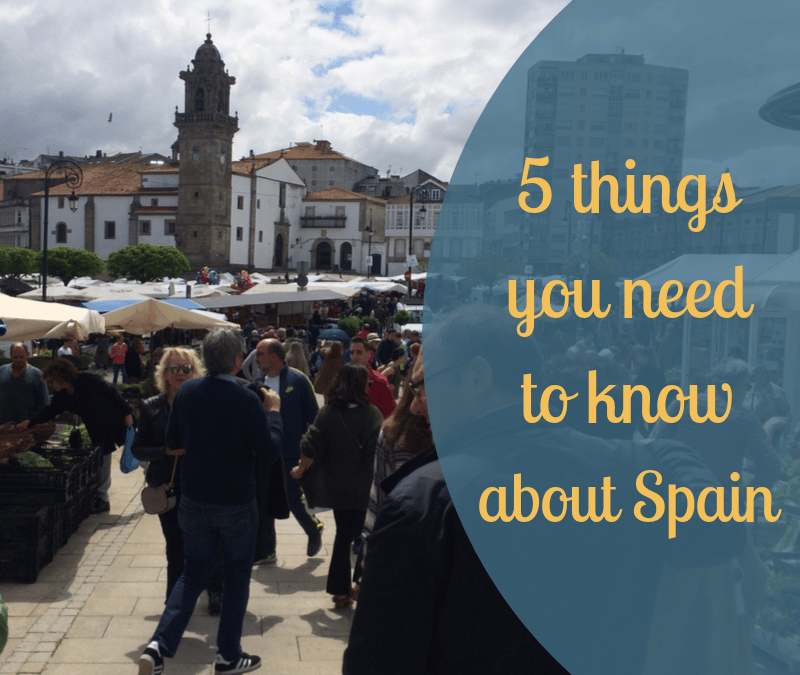When you travel to a foreign country it’s easy to make mistakes because we don’t know how things work over there. It’s easy to assume that everybody does things the same way we do and this can lead to difficult or embarrassing situations.
So, what are the things you need to know about Spain? There are more, but let’s start with these 5:
1. It’s not siesta time!
I read a lot of comments about siesta in Camino forums:
“Everything was closed because it was siesta time”
“There were no people on the streets because it was siesta time”
It’s almost like anything unfamiliar you experience gets blamed on the siesta. Sorry to burst your stereotypes but… siesta is not really a thing in Spain. At least not the way you think it is. If you go to a shop at 3:00 or 4:00pm and it’s closed it is not because it’s siesta time. It’s because it’s lunch time.
Yes. Lunch time. But that’s way more than the usual one hour lunch break, you may say. Well, lunch in Spain is the main meal of the day, quite often a 3-course meal. So, one hour is not enough. Also, traditionally, people would go home for lunch. Not everybody can do that these days, especially in the bigger cities, but many people still do. For more details about eating times, go to nº2.
And if you go for a walk around town at 6:00 or 7:00pm in the summertime and the place is deserted, it’s not siesta time. People could be either at the beach or pool or simply at home, staying away from el calor (the heat).
We don’t put our pyjamas on, get into bed and sleep for 2 or 3 hours in the middle of the day, as many foreigners seem to think. Most of us don’t even take siestas at all. Those who do, it’s mostly a 10-15 minute nap on the sofa. So, por favor, if you find shops closed or streets empty, don’t blame it on the siesta.

2. Don’t criticise our meal times. Try to adapt to them instead.
As I already mentioned, lunch is the main meal of the day, quite often a 3-course meal. It is usually served between 1:30 and 3:30 or 4:00pm.
You’ll have trouble finding dinner before 8:30pm.
The picture shows average kitchen hours, although they may very from place to place.
Instead of complaining because dinner is too late, why don’t you try the Spanish way? Have lunch when you get to your destination for the day; shower, rest and and then you can have something light for dinner, like a drink and a tapa or two.
3. Avoid criticising Spanish customs, even those that we, Spaniards, criticise.
This is like family: you may complain about them but when an outsider criticises them, you feel compelled to defend them. Same thing here: I may disagree with that particular custom but if you, an outsider, criticise it, I may feel forced to defend it. How would you feel if we went to your country and started criticising what you do?
“Why do you not have a proper 3-course meal for lunch?”
“Oh, so you don’t eat tortilla de patatas? That’s weird!”
“Shops close at 6:00pm? Ridiculous!”
Not nice, right? For me, one of the beauties of travelling is to get to see and experience different things, eat different foods… Embrace the difference and enjoy it!
4. Manners, please!
Don’t go over the top with your gracias and por favor. I’m not suggesting you shouldn’t use those words, but we don’t use them half as much as in other cultures. Once or twice per conversation is fine. More than that is too much and you’re going to make the other person uncomfortable. This doesn’t mean we’re rude or don’t have manners. We just express it in different ways.
5. Yes, I’m greeting you.
We might not say please and thank you as much as you do, but we probably greet each other more, even total strangers: you go into a shop, you greet the shop assistant; go into a doctor’s waiting room, you greet the people who are already there; get into a lift with strangers, you greet them.
A simple hola is fine or, depending on the time of the day, you can also add buenos días (in the morning, until lunch time -Spanish lunch time), buenas tardes (in the evening) or buenas noches (later in the evening, from 9:00pm roughly).
These are just 5 basic things you need to know before you travel to Spain. There are more, especially around food, but they would make this post too long and we’ll leave them for another occasion. If, on the other hand, you would like to know whether it’s OK or not to tip and how much is appropriate, you can check this post.
Today’s Spanish words
Siesta
Calor
Hola
Buenos días
Buenas tardes
Buenas noches
Gracias
Por favor
Want more?
Make sure you don’t miss any posts or announcements by subscribing for free here. You’ll receive a free Spanish vocabulary guide with your first Spanish words + cultural tips. And… you’ll get access to exclusive content too.




This is all so true! And as to the critics of customs – we find (while we complain about stuff here in Valencia sometimes) we defend Spanish customs all the time. Especially when we’re back in the US and we hear ‘Why would you move there. Don’t they do xyz? Crazy.’ Even if it’s something that we find difficult we’ll defend the Spanish way. I’m not sure if this is some sort of cultural appropriation on our part or just a need to defend our decision to live in Spain. But we love it here. Do we find things are difficult culturally at times? Yes. But like you say – Maybe just try to understand the WHY and then deal with it. Good post.
Thank you, Kelli! I wouldn’t accuse you of cultural appropriation, so you can keep defending us anytime 😉 Are we going to see you around Galicia soon?
It’s bad some people tend to criticize different cultures when traveling, I’ve seen the same trend on people who visit the country I live in. We might have in mind that a new culture implies different ways to do things and to think. Thanks for the article!